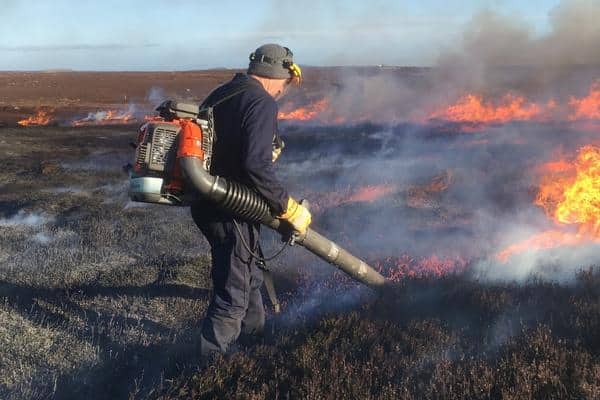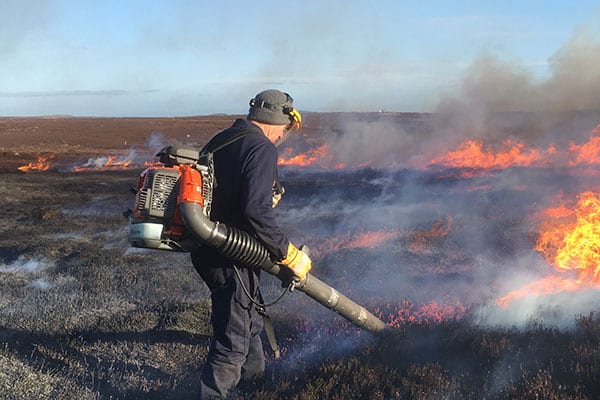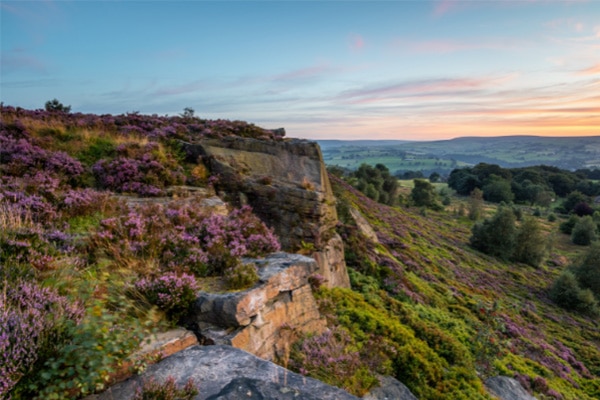
BASC accuses RSPB of exploiting Northern Ireland wildfire
The RSPB have used the recent wildfire in Northern Ireland’s Mourne mountains as a platform to call for a ban on controlled burning.
Get information on the legal shooting season for mammals and birds in the UK.
Learn about our current conservation projects and how you can get involved.
Comprehensive information and advice from our specialist firearms team.
Everything you need to know about shotgun, rifle and airgun ammunition.
Find our up-to-date information, advice and links to government resources.
Everything you need to know on firearms law and licensing.
All the latest news and advice on general licences and how they affect you.


BASC is warning of “disastrous consequences” for our important moorland landscapes unless the RSPB reassesses its evidence base and rethinks its position on managed moorland burning.
In an open letter to the charity’s chair, Kevin Cox, BASC chairman Eoghan Cameron calls out the RSPB’s “increasingly negative” public attitude towards sustainable shooting and “our” community.
Mr Cameron says in the letter that this is “entrenching positions and creating barriers between groups and organisations which should be working together more than ever to tackle our climate and nature emergencies”.
Mr Cameron says in the letter that an example of a divisive approach is the RSPB’s campaign for members of the public to report moorland fires.
BASC is concerned that the charity’s high-profile campaign calling for the public to report all fires – and the subsequent media coverage – is misleading and designed to further an “extreme and inflexible objective” that is at odds with the evidence and one that would have “disastrous consequences for our important moorland landscapes”.
Mr Cameron signs off the letter with the hope that: “Following our advice may start to arrest the widening gulf between the RSPB and many otherwise supportive landowners and land managers.”
He adds: “Doing so would be in the public interest; rather than sowing division, working together would better address the nature and climate crises we collectively face.”
Read the letter in full below.

The British Association for Shooting and Conservation,
Marford Mill,
Rossett,
Ll12 0HL.
9th March 2023
Mr Kevin Cox
Chair of the RSPB
The Lodge
Potton Road
Sandy
Bedfordshire
SG19 2DL
Dear Mr Cox,
As the UK’s largest shooting organisation, The British Association for Shooting and Conservation (BASC) has a clear mission to drive standards for sustainable shooting and to deliver practical conservation.
BASC has always maintained a sector-wide approach. We have pride in our commitment to work with key stakeholders and partner organisations. This has, in the past, included the RSPB.
Unfortunately, your public attitude towards sustainable shooting and our community is increasingly negative. It is entrenching positions and creating barriers between groups and organisations which should be working together more than ever to tackle our climate and nature emergencies.
RSPB campaign to report moorland fires
An example of a divisive approach is your campaign for members of the public to report moorland fires. In your call to action, you state that the current guidelines are not being followed, supporting your inferences of illegal or irresponsible burning practice. However, in response to the reports you submitted to Defra, the government recently exposed these claims as having no foundation. Despite this, the RSPB has not issued any comment, which might correct the misinformation, nor updated its web pages in question.
BASC and the RSPB have different policy positions on controlled management burns.
Our position is very clear and focuses on maintaining and restoring peatlands:
The RSPB, on the other hand calls for all vegetation burning to be banned; this position has been outlined in numerous press articles and the RSPB’s public policy position ‘Ending Peatland Burning. The RSPB’s position on halting managed burning and protecting peatland habitats from wildfire’ (October 2021).
BASC recommends that the evidence base around managed burns should be reassessed by the RSPB and your position on the matter reviewed. The recent publication of a report by the University of York[i] on the management of heather on moorlands concluded that “no one size fits all”. It provides detailed insights into the differences between mowing and burning, the latter absorbing potentially twice the carbon than mowing over a ten-year period. This runs contrary to the narrative RSPB uses, that burning is adding to our climate crisis.
BASC is concerned that the high-profile RSPB campaign calling for the public to report all fires – and the subsequent media coverage – is misleading and designed to further an extreme and inflexible objective that is at odds with the evidence and one that would have disastrous consequences for our important moorland landscapes.
It is important to recognise that moorlands managed by the RSPB – or to the RSPB’s prescription – have, in recent years, been subject to repeated catastrophic wildfires (e.g. Marsden, Forsinard, Stalybridge, Darwin, Saddleworth, Dovestones and many more). These fires, which were a predicted consequence of the policy you are promoting, released hundreds of thousands of tons of CO2, destroyed peat that will take centuries to replace and ecosystems that may never recover.
BASC believes that your campaign is designed to confuse the public about the burning regulations and prop up an erroneous narrative that grouse moor managers were engaged in criminal activity on an industrial scale.
Subsequent accusations were woefully inaccurate. For example, the BBC said the RSPB had evidence of 79 illegal burns. However, the facts established by a six-month investigation by Natural England (NE) and Defra were in stark contrast. After a written question was raised by Sir Robert Goodwill MP, the official response was illuminating. It revealed that there had been 1,584 individual reports of alleged breaches of the Heather and Grass Burning (England) Regulations since it came into force on 1 May 2021. Of these, only one fire was found to be a technical breach of the guidelines.
The RSPB has not responded publicly to the conclusion of the official investigation. Instead, you have simply carried on as though nothing had happened. Consequently, more allegations have been submitted to Defra by the RSPB. Critically, the phone app used for the public to report burning is still live despite its failings.
You must be aware that investigating these spurious allegations is a costly matter and involves the deployment of considerable human resource from both the regulator and the landowners.
This approach by the RSPB has undermined relationships with the shooting community, landowners, and other sections of the rural community.
BASC believes that to continue down this path, forcing NE, Defra, and the landowners to spend more time and resources investigating these claims, is irresponsible and a clear waste of public funds.
How would BASC like the RSPB to respond?
BASC believes the RSPB could move towards improving this situation in several ways:
Following our advice may start to arrest the widening gulf between the RSPB and many otherwise supportive landowners and land managers. Doing so would be in the public interest; Rather than sowing division, working together would better address the nature and climate crises we collectively face.
[i] https://www.york.ac.uk/news-and-events/news/2023/research/heather-management-protecting-peatlands/
Yours sincerely,
Eoghan Cameron
BASC Chairman

The RSPB have used the recent wildfire in Northern Ireland’s Mourne mountains as a platform to call for a ban on controlled burning.

Government announcement on heather burning offers promise of licences as consequences of a blanket ban recognised.

Transport yourself to stunning Calderdale with the Moorland Chorus, capturing the sounds of dawn breaking on grouse moor teeming with life.
Sign up to our weekly newsletter and get all the latest updates straight to your inbox.
© 2023 British Association for Shooting and Conservation. Registered Office: Marford Mill, Rossett, Wrexham, LL12 0HL – Registered Society No: 28488R. BASC is a trading name of the British Association for Shooting and Conservation Limited which is authorised and regulated by the Financial Conduct Authority (FCA) under firm reference number 311937.
If you have any questions or complaints about your BASC membership insurance cover, please email us. More information about resolving complaints can be found on the FCA website or on the EU ODR platform.
This website uses cookies so that we can provide you with the best user experience possible. Cookie information is stored in your browser and performs functions such as recognising you when you return to our website and helping our team to understand which sections of the website you find most interesting and useful.
Strictly Necessary Cookie should be enabled at all times so that we can save your preferences for cookie settings.
If you disable this cookie, we will not be able to save your preferences. This means that every time you visit this website you will need to enable or disable cookies again.
This website uses Google Analytics to collect anonymous information such as the number of visitors to the site, and the most popular pages.
Keeping this cookie enabled helps us to improve our website.
Please enable Strictly Necessary Cookies first so that we can save your preferences!
More information about our Cookie Policy